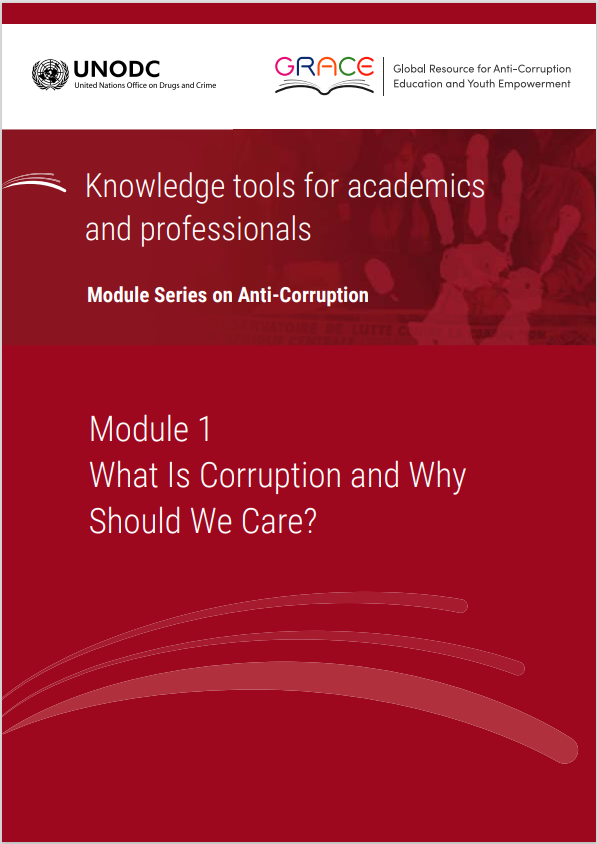This module is a resource for lecturers
Appendix
How corruption affects the Sustainable Development Goals (SDGs)
|
Goal |
How corruption affects the Goal: examples |
Module* |
|
|
1 |
No poverty |
Corruption reduces the amount of aid that reaches the poor. The poor lose a larger percentage of their income to bribery and extortion than other groups. |
1, 11 |
|
2 |
Zero hunger |
Because corruption impedes investment and the development of infrastructure, and kleptocracy concentrates a country's wealth, resulting in famine and malnourishment. |
1, 11 |
|
3 |
Good health and well-being |
In more corrupt countries, hospitals lack the necessary medicines due to embezzlement or overpriced purchase agreements; access to beds or care is based on willingness to pay, even in countries with ostensibly free health care. |
1, 11 |
|
4 |
Quality education |
Corrupt administrators charge illicit "registration fees" or "maintenance fees" for access to "free" public education, excluding families unable to pay. Teachers are hired based on their political connections or bribery, so the quality of education is lower than it should be. Funds are embezzled, so even dedicated teachers lack the necessary resoures, materials and infrastructure. |
9 |
|
5 |
Gender equality |
Women are disproportionately victims of sextortion. Gender relations in some countries exclude women from corrupt networks (and, therefore, from the resources offered by those networks). |
8, 11 |
|
6 |
Clean water and sanitation |
Firms bribe inspectors to allow them to dump chemicals illegally rather than dispose of them safely. Firms and farms bribe or lobby lawmakers to write pollution-friendly laws. Organized crime groups sometimes "win" sanitation contracts. |
1, 11 |
|
7 |
Affordable and clean energy |
Oil and coal lobbies engage in bribery or exchange of favours to fight programmes designed to promote alternative energies. |
1 |
|
8 |
Decent work and economic growth |
Especially in resource-rich countries, embezzlement or kleptocracy results in rich countries with poor communities (" Nigerian disease") because no effort is made to generate quality jobs. Populist policies keep kleptocrats in power and transnational firms enjoy access to resources with little or no commitment to provide decent work for local workers. Corruption also facilitates money-laundering, and vice versa. In financial/tax havens or secrecy jurisdictions, the inflow of vast amounts of hard currency appreciates the local currency, suppressing other types of exports. (This phenomenon is common in single-export countries and referred to as "Dutch disease"; Williams, 2011) |
2 |
|
9 |
Industry innovation and infrastructure |
Corruption (kickbacks or conflicts of interest) leads the government to subsidize the wrong industries and undertake unnecessary infrastructure projects, rather than the ones that would support increases in productivity. |
2, 11 |
|
10 |
Reduced inequalities |
There is a vicious circle between corruption and inequality: less equal societies are more corrupt and more corruption causes more inequality (You & Khagram, 2005). |
1, 2, 11 |
|
11 |
Sustainable Cities and Communities |
Bribery by the petroleum and coal industries undermines programmes to promote clean energy. The petroleum industry alone generates billions of dollars in bribes and embezzlement in many countries, so there are few incentives to abandon petroleum (McPherson & MacSearraigh, 2007). |
1 |
|
12 |
Responsible Consumption and Production |
Corruption distorts market forces, so that the wrong kinds and quantities of goods and services are produced and consumed. In some cases, corruption guarantees monopolies where competition would promote more responsible production. |
2 |
|
13 |
Climate action |
Corruption allows firms and individuals to pollute in excess of legal limits, and to exploit resources (such as trees and mines) beyond the sustainable limit. |
1 |
|
14 |
Life below water |
Corruption contributes to overfishing, destruction of habitat, and dumping chemicals or other materials into the sea. |
1 |
|
15 |
Life on land |
Illegal logging destroys habitat. Illegal dumping of chemicals damages ecosystems. |
1, 11 |
|
16 |
Peace, Justice, and Strong Institutions |
Corruption undermines justice systems and the legitimacy of government; it enables and fuels organized crime and terrorism; and allows violations of human rights to go unpunished. |
2, 6, 7 &11 |
|
17 |
Partnerships for the Goals |
Countries must work together to combat corruption and promote integrity and good governance, as also laid out in the United Nations Convention against Corruption (UNCAC). |
14 |
* Corresponding Module of the E4J University Module Series on Anti-Corruption
 Back to top
Back to top
